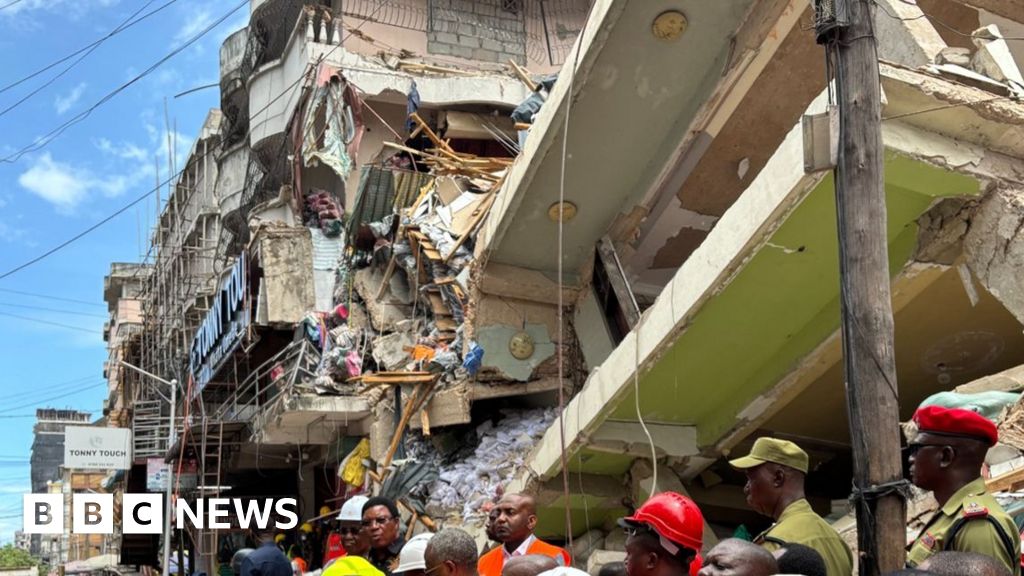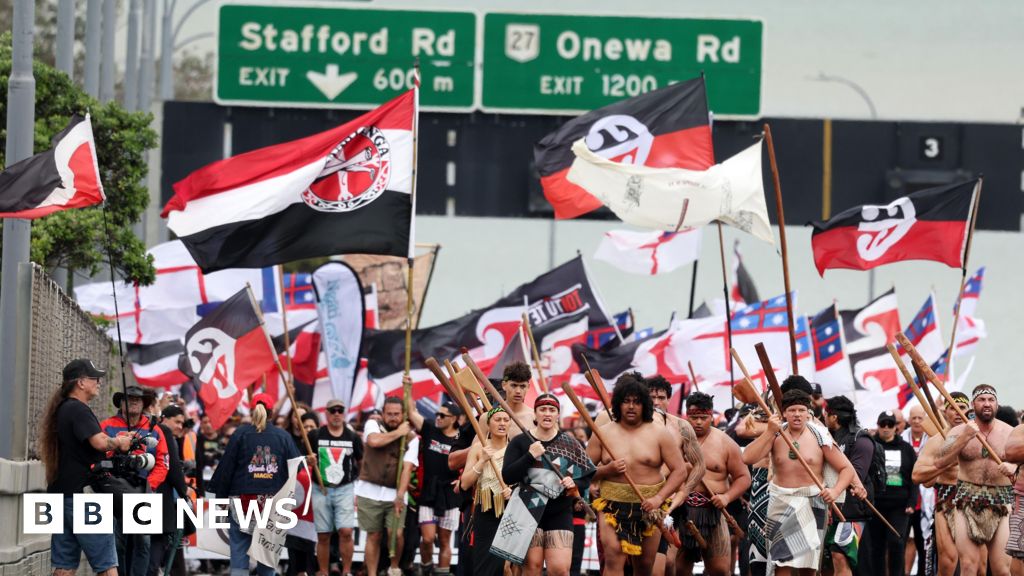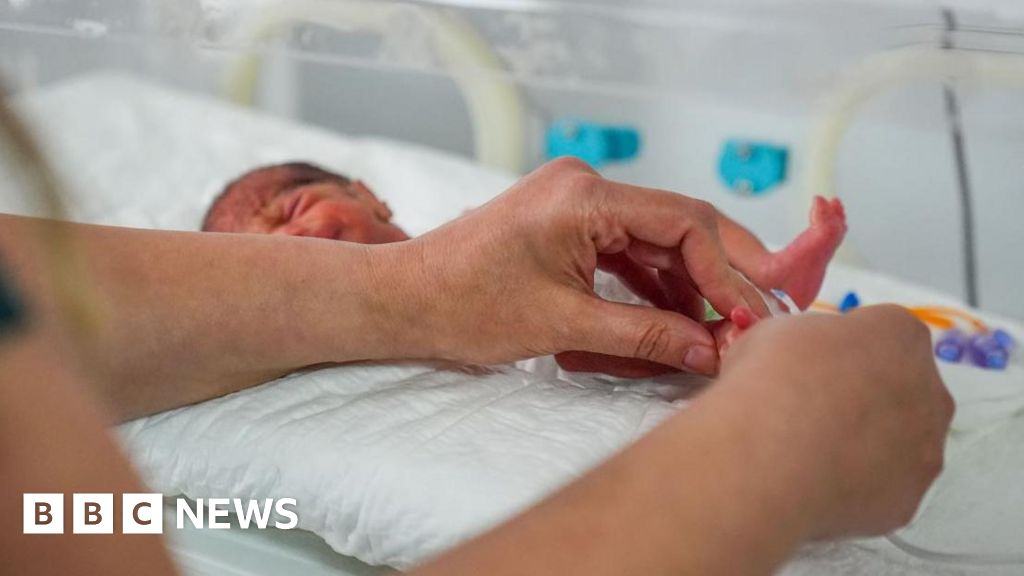ARTICLE AD BOX
WATCH: The moment a gunshot is heard before Shinzo Abe collapses
Police investigating the assassination of Japan's ex-prime minister Shinzo Abe have said the suspect held a grudge against a "specific organisation".
The alleged gunman, named as Tetsuya Yamagami, 41, believed Abe was part of the group and shot him for that reason, they said, without naming the group.
Abe died in hospital on Friday morning after being shot while speaking at a political campaign event.
Tetsuya Yamagami has admitted shooting him with a homemade gun, police said.
Abe was Japan's longest-serving prime minister and his death at the age of 67 has profoundly shocked a country where gun crime is very rare.
Prime Minister Fumio Kishida said he was "simply speechless" at the news of Abe's death, vowing that Japan's democracy would "never yield to violence".
Police are still investigating whether his killer acted alone and why Abe was targeted out of other people related to the unnamed organisation.
Suspect stood behind Abe as ex-PM gave speech
Abe was giving a speech for a political candidate at a road junction in the southern city of Nara when the attacker struck from behind.
Witnesses described a man carrying a large gun move within a few metres of Abe and fire twice at the former PM, who fell to the ground as bystanders screamed in shock and disbelief.
Photos circulating in the aftermath of the shooting showed the suspect standing just behind Abe as he gave his speech.
Security officers dived on to the gunman who made no attempt to run after he fired on Abe.
The weapon that killed the politician was made using metal and wood, officers said, and appeared to be wrapped in duct tape.
Several other handmade guns and explosives were later found at the suspect's home.
Abe suffered two bullet wounds to his neck during the attack and also suffered damage to his heart.
He was said to be conscious and responsive in the minutes after the attack, but doctors said no vital signs were detected by the time the former prime minister was transferred for treatment.
Medics worked for hours to save him and Abe received more than 100 units of blood in transfusions, before he was pronounced dead at 5.03pm local time (0803 GMT).
Image source, Reuters
Image caption,The improvised weapon lies on the ground after the alleged gunman was arrested
The politician was out campaigning for his former party, the Liberal Democratic Party, in the run-up to elections on Sunday.
On Japanese social media, the hashtag "We want democracy, not violence" was trending throughout Friday, with many social media users expressing their horror and disgust about the incident.
Gun violence is extremely rare in Japan, where handguns are banned and incidents of political violence are almost unheard of.
In 2014, there were just six incidents of gun deaths in Japan, as compared to 33,599 in the US. People have to undergo a strict exam and mental health tests in order to buy a gun. Even then, only shotguns and air rifles are allowed.
How the attack unfolded
Image source, Reuters
Image caption,In a photograph taken moments before the attack, the alleged gunman can be seen standing behind Mr Abe in a grey t-shirt with a black bag
- Abe was campaigning in the southern city of Nara - around 300 miles (480km) from the capital city, Tokyo - for a parliamentary election on Sunday
- He was giving a speech for political candidate Kei Sato - a member of the Upper House running for re-election in Nara
- At 11:30 local time (02:30 GMT) shots rang out and Abe was shot twice in the neck
- He immediately collapsed and was rushed to the nearest hospital
- Security officials at the scene tackled the gunman, who is now in custody
- An unidentified weapon was filmed on the ground after the attack
- After four hours of treatment, Abe was pronounced dead at 17:03 local time (08:03 GMT)
Abe, who was Japan's longest-serving prime minister, held office in 2006 for a year and then again from 2012 to 2020, before stepping down, citing health reasons.
He later revealed that he had suffered a relapse of ulcerative colitis, an intestinal disease.
While he was in office, he pushed more assertive policies on defence and foreign policy and had long sought to amend Japan's pacifist post-war constitution.
He also pushed for an economic policy that came to be known as "Abenomics", built on monetary easing, fiscal stimulus and structural reforms.
He was succeeded by his close party ally Yoshihide Suga, who was later replaced by Fumio Kishida.
Image source, Asahi Shimbun/Reuters
Image caption,The suspect was confronted by a police officer following the shooting
'Despicable attack'
Prominent voices across the world condemned the incident, with UK Prime Minister Boris Johnson calling it a "despicable attack".
US President Joe Biden said he was "stunned, outraged, and deeply saddened" by the assassination, calling it "a tragedy for Japan and for all who knew him".
In Brazil, President Jair Bolsonaro declared three days of national mourning, expressing outrage and sadness, while Indian Prime Minister Narendra Modi described Abe as a global statesman.
South Korean President Yoon Suk-yeol called the attack an "unacceptable act of crime" and extended condolences to "the Japanese people for having lost their longest-serving prime minister and a respected politician".
Chinese Foreign Ministry spokesman Zhao Lijian said his country was shocked by the attack.
He added that "this unexpected incident should not be associated with Sino-Japanese relations" and had no comment when asked about Chinese social media reaction.
Comments gloating over the attack on Mr Abe have dominated Chinese social media and have also surfaced on Korean platforms.
China and South Korea have historically had complicated and fraught relationships with Japan. Abe, known for his military hawkishness, was unpopular with citizens of both countries during his term in office.

 2 years ago
21
2 years ago
21








 English (US)
English (US)